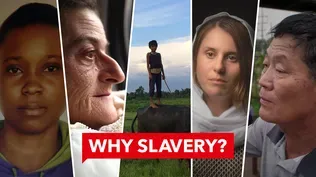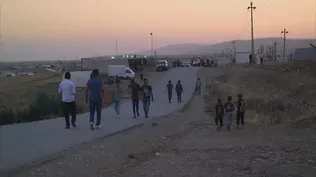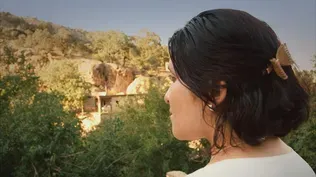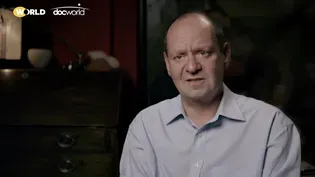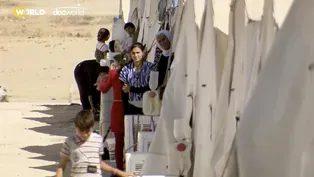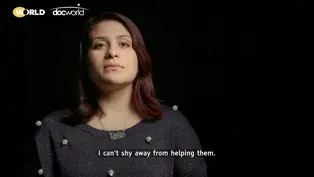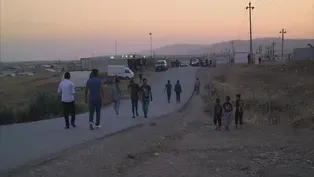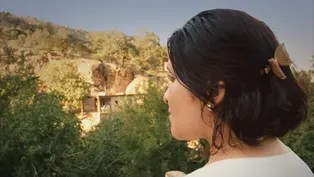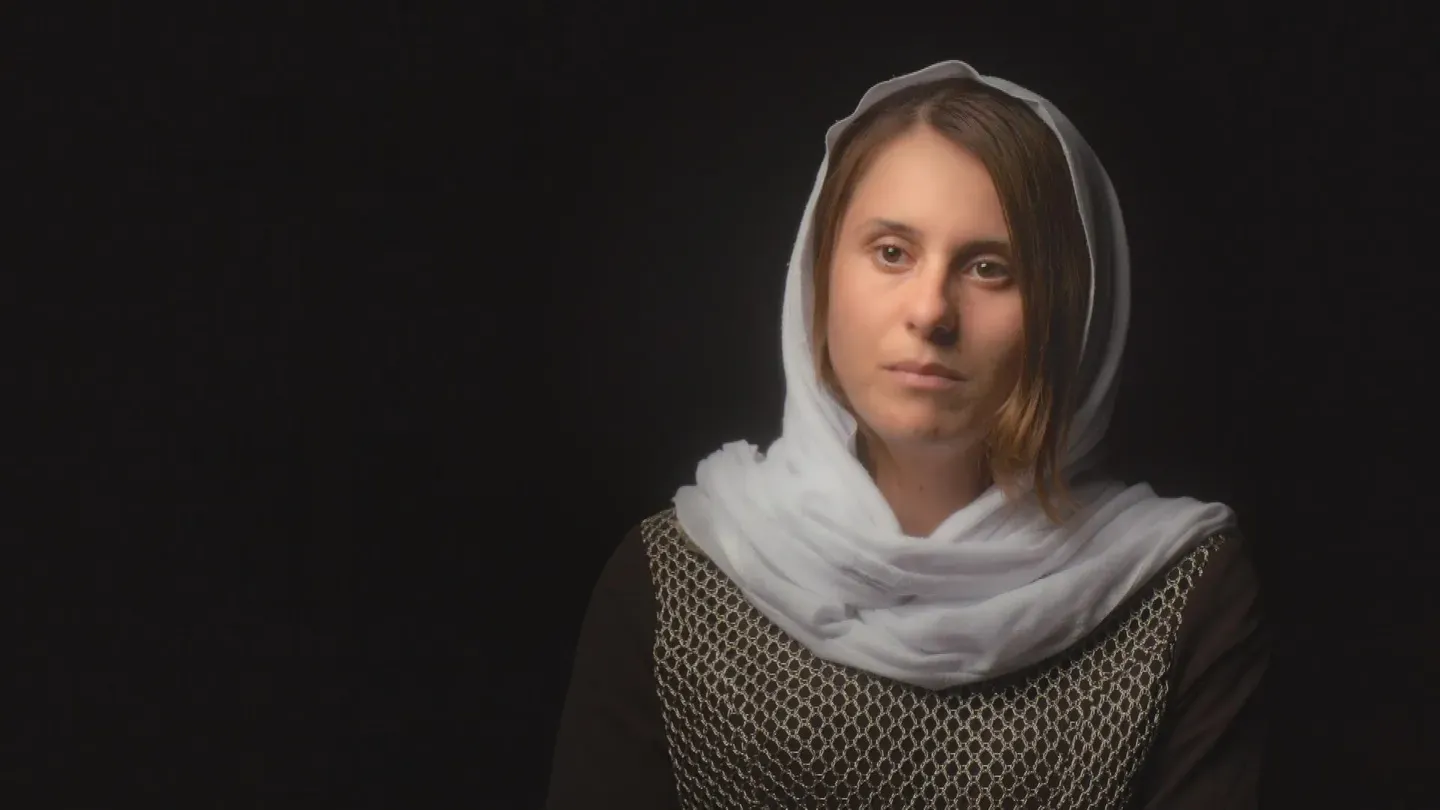

WHY SLAVERY? I Was A Yazidi Slave
Season 4 Episode 9 | 58m 56sVideo has Closed Captions
Can a path to justice and healing be found after genocide, sexual violence and slavery?
In 2014, Islamic State fighters invaded Yazidi settlements in Iraq. Men were massacred while young women were kidnapped to be enslaved, tortured, and systematically raped. Two Yazidi women tell their story of escape to Germany with the assistance of a renowned trauma expert. Their journeys to recovery ask how a survivor of unthinkable sexual violence can find justice and a path to rehabilitation.
Funding provided by the Corporation for Public Broadcasting. Additional funding provided by the John D. and Catherine T. MacArthur Foundation and the Wyncote Foundation.

WHY SLAVERY? I Was A Yazidi Slave
Season 4 Episode 9 | 58m 56sVideo has Closed Captions
In 2014, Islamic State fighters invaded Yazidi settlements in Iraq. Men were massacred while young women were kidnapped to be enslaved, tortured, and systematically raped. Two Yazidi women tell their story of escape to Germany with the assistance of a renowned trauma expert. Their journeys to recovery ask how a survivor of unthinkable sexual violence can find justice and a path to rehabilitation.
How to Watch Doc World
Doc World is available to stream on pbs.org and the free PBS App, available on iPhone, Apple TV, Android TV, Android smartphones, Amazon Fire TV, Amazon Fire Tablet, Roku, Samsung Smart TV, and Vizio.
Providing Support for PBS.org
Learn Moreabout PBS online sponsorshipANNOUNCER: When the Islamic State invaded Iraq, young Yazidi women were enslaved and tortured.
(sobs) (speaking Kurdish): ANNOUNCER: Now many of the survivors are determined to start new lives.
SHIRIN: ANNOUNCER: "I Was A Yazidi Slave," on DocWorld.
♪ NARRATOR: In June 2014, so-called Islamic State fighters occupied huge areas of Syria and Iraq, entirely overwhelming the Yazidi community grouped around Mount Sinjar.
Thousands of Yazidis fled before the advance.
Those that fell into I.S.
hands were met with the utmost brutality.
Men were killed, young women forced into slavery.
(speaking Kurdish): (speaking non-English language): MAN: (sobbing) NARRATOR: In a few short weeks, a culture that had existed for thousands of years was brought to the brink of destruction.
Though I.S.
were eventually driven out of Iraq, they left behind a broken society and thousands of damaged people.
What hope do the survivors of I.S.
violence have to rebuild their lives?
Will the Yazidis ever find justice for what has happened to them?
♪ SHIRIN: (people whistling) (whistling, crowd cheering) (whistles and cheers fade) MAN: Takbir!
MEN: Allahu akbar!
MAN: Takbir!
MEN: Allahu akbar!
(man speaking on radio) (rumbling in distance) LEWIZA: ♪ (men singing in non-English language) (man speaking non-English language) ...are preparing to explode the building.
But now they're setting up the cables and the explosives, so we'll take a look inside.
(speaking non-English language) (song continues) You see here prisoners.
They are Yazidi people.
Look at these idiots.
(song continues) SHIRIN: (crowd screaming, crying) (men speaking non-English language) LEWIZA: (speaking non-English language): (men talking in non-English language) (people talking in background, baby crying) NARRATOR: The Yazidis' desperate attempts to escape I.S.
by fleeing up Mount Sinjar without either food or water were caught on camera and broadcast all over the world.
(people yelling and crying) (protesters shouting) NARRATOR: Germany is home to more Yazidis than any other European country.
They reacted with horror to the news from Iraq, and thousands took to the street in protest.
JAN KIZILHAN: When we get the first information about killing and mass executions, it was, for all of us, a shock.
Because I am a Yazidi-- my parents came from Kurdistan-- I know this area.
I have a lot of relatives and friends.
And they called me and said, "Um, please... "Talk to any politicians, talk to the German government.
"Do anything-- we are facing a genocide and we don't know what we can do."
(people shouting indistinctly) KIZILHAN: This feeling of helpless is the worst feeling that you ever have as a human being.
Because you know everything: you know they will kill children, they will behead peoples, they will rape womans.
But you are sitting here and you cannot do anything.
♪ (announcer speaking German) (speaking German): (speaking German): NARRATOR: The young Yazidi women who were sold into sexual slavery were trafficked to I.S.
centers across the Arab world.
Lewiza was eventually taken to Raqqa, the biggest I.S.
stronghold in Syria.
LEWIZA: NARRATOR: Lewiza finally found safety in one of the refugee camps that appeared in Northern Iraq in the wake of the I.S.
attacks.
KIZILHAN: And when the Yazidis women and girls get free from the I.S., they came to refugee camps.
18,000 to 20,000 people live in one camp.
All Yazidis.
One tent by another one.
The condition is very bad.
Just imagine the situation of the Yazidis.
Sinjar is destroyed by 90%.
It's not possible to go back.
(birds tweeting) We were talking with ministers in the state of Baden-W ürttemberg.
And, actually, the prime minister, Mr. Kretschmann, came by the idea of bringing women captured by the I.S.
to Germany.
(speaking German) KIZILHAN: The journalist asked, "How many girls you want to bring?"
And I think, "Maybe I will be lucky if they will take 20 person or 100 persons."
And he looked to the left, right, and he looked to the right, right.
And he said, "1,000."
And that's it.
And so we started with this 1,000 person.
How money you need to bring them to Germany and give them medical treatment, the doctors' payment and houses and all things?
And we came to amount of 95 million euros that we need.
And they said okay.
And then we started.
♪ Before I went into Iraq, I had already 800 names of girls and womans captured by the I.S.
and were living now in refugee camps.
KIZILHAN: You know, to be honest, decided, "Yes, they can came to Germany," it was easy.
But on the other side, so you have to make the decision sometimes to say, "No, it's not possible."
NARRATOR: Dr. Kizilhan believed I.S.
raped and enslaved Yazidi women as a means to destroy the whole community.
The damage this had done made the selection process more painful.
KIZILHAN: It was really a very, very difficult situation for me, because we know, after to be raped by the I.S., many of the families expelled the girls.
They said, "You are not anymore belong to our society.
You are dishonored."
More than 20 committed suicide, because they're not accepted by their own families.
You know, you feel like to make a decision about life or not life.
♪ NARRATOR: 18 months after her capture by I.S., Lewiza finally arrived in Germany.
KIZILHAN: It was kind of bit of stress and fear.
They don't know what has happened.
They don't know what is expected.
Nobody knows really something about Germany.
And they don't know how to go to doctor, how to shopping, so we have to orientate them.
(talking in background) KIZILHAN: We have to treat women and girls, but also support with special knowledge: the doctors, translators, social workers, and psychotherapists.
(birds chirping) NARRATOR: Helping people with post-traumatic stress disorder has always been part of Dr. Kizilhan's practice.
Now, for the first time, he found himself responsible for the care of members of his own community.
KIZILHAN: We have some cases who are totally destabilized.
They have kind of lost themself.
And for that, you need bring them to the hospital and treat them every day.
They need a time of stabilization.
Germany, it's a really a different world.
Streets, traffics, police, cars, shopping centers...
Some of them never see a big city.
So this is kind of trans-cultural therapy.
You need a confrontation with your own trauma.
But for that, you have to be very strong.
To say, "Yes, I'm ready to talk about this capture, talk about this torturing, about the raping."
If you go too fast and talk too much about this trauma event, you will re-traumatize these persons.
(child talking in background) KIZILHAN: And it's individual.
Someone needs three months, someone need maybe eight months.
So we will see how it work.
(child talking in background) NARRATOR: Dr. Kizilhan felt it would aid the women's recovery if they knew that the world understood the enormity of what had happened to them.
KIZILHAN: I am not a lawyer, but if someone is doing something very systemically and wanted to destroy a group, a huge group, so, this is, for me, genocide.
As a psychologist, this is a continuing of fighting for identity.
It's not a problem of who did it.
And maybe, if you're thinking positive, despite all this cruelty and all this horrors, this is also this chance that the world community would recognize, "Yes, there is a group in the Middle East, "they are called Yazidis, they have rights, and we should accept them as their own identity."
(talking indistinctly) NARRATOR: In March 2016, he sought advice from a lawyer about what sort of case might be built on behalf of the women in his care.
Professor Sands is a barrister who spent 25 years working on crimes against humanity and genocide.
He asked if he could interview any of Dr. Kizilhan's patients.
PHILIPPE SANDS: I wanted to know whether the evidence they might give was the kind of evidence that could stand up in court.
So you're looking to see their attention to detail, the clarity of their memory, the extent to which they're certain or uncertain.
The question you're really asking yourself is, if they were subject to a vigorous cross-examination, would it withstand that type of attack?
(birds twittering) (woman speaking non-English language) SANDS: If I can just begin by, if she could tell us her name and her age?
(Kizilhan speaking Kurdish) - Em... SANDS: And they were able to identify locations and places and people and time, which is all material that is enormously helpful to a prosecutor in deciding whether to bring a case.
Where does Shirin get the strength to tell this story?
(Kizilhan speaking Kurdish) - (chuckles softly) SANDS: I mean, nothing beats looking someone in the face who tells you what has happened to them.
And this was on a totally different scale from anything that I'd heard.
(woman coughs) (Kizilhan speaking Kurdish) - (replies softly) KIZILHAN: Okay.
SANDS: Is she okay?
KIZILHAN: Mm.
(sobs) SANDS: What about the punishment of the people who've treated her in the way they have?
SANDS: I left wanting to help them.
And if I, through the law, could contribute, I was gonna do that.
And if that meant proving that genocide had happened, I was gonna do that.
LEWIZA: (talking softly) NARRATOR: Throughout 2016, Dr. Kizilhan and his team kept track of every woman's recovery on a case-by-case basis.
When the time was right, his patients moved to new homes throughout the state of Baden-W ürttemberg.
KIZILHAN: The most important thing is how we can integrate them in the German society.
If you located 1,000 person in one area, in one huge hospital, what will happen?
They will talk Kurdish, they will keep their own values, old values.
They will have no contact with German society.
So we will have a ghettoization, and we don't want that.
Hello!
MAN: Hello!
SHIRIN: (children talking) SHIRIN: (calling in Kurdish) (sniffs) ♪ NARRATOR: The International Criminal Court in The Hague has the jurisdiction to prosecute individuals for war crimes, crimes against humanity, and genocide.
SANDS: I worked at the International Criminal Court for many years, and I went to the Hague and met in particular with one prosecutor and said, "Look, I've met a couple of really interesting people.
I'm interested in assessing the credibility, the weight, the authoritive-ness of what it is they're saying.
And it was very clear the moment he started watching, these were credible, reliable witnesses.
SHIRIN: I mean, on a human level, I mean, obviously this is a very...
It's very moving, very painful statement.
And then the different, I mean, act that have been committed, I mean, I mean, could very well constitute offenses under the statute.
I mean, and rape is the most obvious one.
But there is also sexual slavery, there is forced pregnancy.
There is a, a number of other things.
- Sexual slavery falls within the jurisdiction.
- Yes, definitely, definitely.
- Yeah?
- As a crime against humanity.
- She has the name, she has the location, she has the nationalities.
- Yeah, exactly.
She recalls the facts very well.
She's able to tell her story in a very, I mean, clear and structured manner.
She's very specific in her recollection.
And, um, and if she knows names and the nationality, locations, I mean, they are factual information that are, that are critically important for any investigation.
JOURNALIST: Fallujah.
Finally cleared of Islamic State militants.
And the general commanding the operation has declared the battle over.
(speaking non-English language): ♪ NARRATOR: During 2016, defeated I.S.
fighters began to be brought before Iraqi courts.
But their trials did not meet international standards.
SANDS: Cases last ten, 12, 15 minutes.
Stories emerge, vaguely, and then, the defendants are executed.
Does that help over the long run?
I don't think it probably does.
What matters is a record before a responsible court, so I would say, you want these cases to be judged before an international criminal court, because it will send a signal to the world that a serious act of wrongdoing has occurred, whether it's a crime against humanity, whether it's a genocide.
And I do think that just lining them up and shooting them is not good enough.
♪ (firing) NARRATOR: The Commission for International Justice and Accountability, or CIJA, gathers evidence of the kind that does support trials of international standard.
But assembling that evidence in a war zone isn't easy.
(weapons firing) NERMA JELACIC: It is risk-taking, but any type of work in a conflict zone is risky.
(guns firing in distance) As human beings, we are drawn to victims' stories and we are, most of us, designed to feel compassion and understand the pain of the loss or the suffering that they have, that they have gone through.
But in the court of law, that will only take you so far.
And this is why what we call linkage evidence is so important.
You need to build these links from the highest level, to the people around him, to the mid-ranking, to the, to your lowest-level direct perpetrator, who may have shot or sniped or raped somebody.
Without it, we would only be stuck with prosecuting the direct perpetrators.
But what we saw in Iraq was something quite unprecedented.
The crimes of such gravity... ...that international criminal law needs to be upheld, not only for the better future of the community affected by that war, but for the better future of us all.
NARRATOR: As the defeat of I.S.
continued in 2017, it became clear that there was little public support for a big international trial.
In relation to things like ISIS and other atrocities in various parts of the world, there is a growing demand for summary justice.
I mean, we see it with the British members of ISIS who happened to be caught.
When it's debated in the British papers, there is a large number of people who simply say, "What's the point of putting them on trial?
Let's just kill them."
RADIO ANNOUNCER: This is LBC, Leading Britain's Conversation, with Shelagh Fogarty.
MAN (on phone): It'll cost thousands and thousands and hundreds of thousands to put 'em on trial.
And then, it'll cost even more thousands and thousands and thousands to give 'em a cushy cell for the next 15 years.
Then they'll probably be set free.
FOGARTY: An assessment of the facts, at least, is vital, isn't it?
Before we start putting bullets in people's heads in the sands of Syria?
MAN: Of course, of course.
MAN 2 (on phone): We're no longer in the position to be that soft touch.
We have to take a stance.
I would personally torture them, I would get as much information as we possibly can to infiltrate the groups that are either here or abroad trying to come here, and personally, I would swing them from the rope.
FOGARTY: Here in the studio is Philippe Sands QC, professor of law at University College London, and Melanie Phillips, the columnist at "The Times."
Melanie, kick us off here-- what should happen to them?
What should we do about them?
We are bombing these people for good reason, because they are...
It's not possible to deal with it any other way.
FOGARTY: What is your problem with that, Philippe?
My problem with that is, where do you draw the line?
Do we open the door to a policy of executing our own nationals?
That's essentially the issue.
PHILLIPS: No, the issue is, do you open the door to laying this country wide open to people being murdered because you are standing on some abstract legal principle?
♪ SANDS: If terrible atrocities happen and you just move to a simple arrangement of summary justice, the facts get forgotten with the passage of time, and I think people like Lewiza and Shirin are entitled to have what was done to them known widely.
What's interesting is that Germany has decided to investigate the crimes of ISIS/Daesh and to apply to those crimes the rules of international criminal law.
♪ Back in 1945, the Germans were in the dock.
Today, the Germans are taking a leadership role.
PETER FRANK (speaking German): ♪ NARRATOR: By the spring of 2017, Shirin no longer needed treatment at Dr. Kizilhan's clinic.
Instead, she saw a therapist in the small town where she'd settled.
SHIRIN (speaking non-English language): MUELLER (speaking German): SHIRIN (speaking German): MUELLER: Gut, okay.
SHIRIN: Ja.
MUELLER: - Em... MUELLER: SHIRIN: MUELLER: Mm-hmm.
SHIRIN: (speaking Kurdish): KIZILHAN: She learned in Germany as a woman and as an individual get respect by other people.
They recognize there is no reason to be ashamed.
And this gives her the confidence and the power to speak about it.
And this character, this personality is also a person who like to fight.
And she finds a way to cope with trauma to talk openly about it and be the voice of her own people.
Lewiza is different, Lewiza is maybe...
Most important point to change in a positive way was the freed of his family.
And this was very important for her to accept now, "I am now in Germany.
"My family is free, my mother, my brothers are free.
They are under bad condition, but they are living."
(talking indistinctly) LEWIZA: We could see this girl who was fear, anxiety, was grow up like a flower.
She started to laughing, smiling, get in contact with people, have friends now.
She's now really a different person.
LEWIZA: SHIRIN: ♪ NARRATOR: In June 2017, Dalal suddenly decided to return home to Iraq.
(woman speaking non-English language) NARRATOR: Dalal's father had been working away from home when I.S.
arrived.
He was waiting at the airport to welcome her with other surviving members of her close family, whom Dalal had not seen for nearly three years.
(speaking indistinctly) (speaking indistinctly) NARRATOR: Since she left Iraq, with so many Yazidi towns and villages destroyed by I.S., refugee camps like Shekhan had begun to feel like long-term residences.
(people talking in background) INTERVIEWER (speaking Kurdish): - (speaking Kurdish): INTERVIEWER: DAWOOD: (music playing in distance) (speaking indistinctly) - (laughing) (speaking non-English language): (speaking indistinctly) ♪ (people talking in background) ♪ (people talking in background) (grunts, door closes) (sobbing, exclaiming) (sobbing) (man exhales) (Dalal sobbing) (sobbing, exclaiming) ♪ KIZILHAN: Still now we don't know what will happen in the future with the Yazidis.
I'm not sure if they will able to cope this catastrophe.
If not, I believe they will not exist in three, four, five generations anymore.
And this is one of the oldest cultures in the Middle East, which going back to 4,000 years.
So we are maybe witness now the end of a, of a small ethnic group.
The second option, is possible that they are learning from this genocide, from this catastrophe.
And through this trauma, they can change the rules and they can change some of the old behaviors, cultures, and tradition, and have a better future, maybe.
Because, you know, Yazidis, especially the womans, was very confused regarding their identity.
They're raped by the I.S., and they believed by the rape that they are not Yazidi anymore.
♪ NARRATOR: Before returning to Germany, Dalal visited the high priest in Lalish to receive his blessing.
HIGH PRIEST and DALAL (speaking Kurdish): HIGH PRIEST: DALAL and HIGH PRIEST: KIZILHAN: This is the first time in the Yazidi history a high priest stands up and say, "Yes, we will change this rules."
And that, for Yazidis, a revolution.
♪ This genocide, how cruel it is, it's a huge chance by the Yazidi community to define themself a new way.
And this way maybe, hopefully, is democratic, is pluralistic.
And they will be able to survive not just in Kurdistan, they'll be able to survive in the whole world.
LEWIZA: ♪ (tram bell rings) DALAL: ♪ ♪ ♪ ♪ ♪
WHY SLAVERY? I Was a Yazidi Slave | Crimes Against Humanity
Video has Closed Captions
Bringing modern slavery - a crime against humanity - to the International Criminal Court. (25s)
WHY SLAVERY? I Was A Yazidi Slave | Enslaved and Abandoned
Video has Closed Captions
Once enslaved, Yazidi women and girls are now rejected by their own people. (25s)
WHY SLAVERY? I Was a Yazidi Slave | Giving Back
Video has Closed Captions
Event after her own experience, Yazidi woman Dalal shares why giving back is necessary. (32s)
WHY SLAVERY? I Was A Yazidi Slave | Preview
Video has Closed Captions
Can a path to justice and healing be found after genocide, sexual violence and slavery? (30s)
WHY SLAVERY? I Was A Yazidi Slave | Trailer
Video has Closed Captions
Can a path to justice and healing be found after genocide, sexual violence and slavery? (1m 17s)
Providing Support for PBS.org
Learn Moreabout PBS online sponsorshipFunding provided by the Corporation for Public Broadcasting. Additional funding provided by the John D. and Catherine T. MacArthur Foundation and the Wyncote Foundation.
